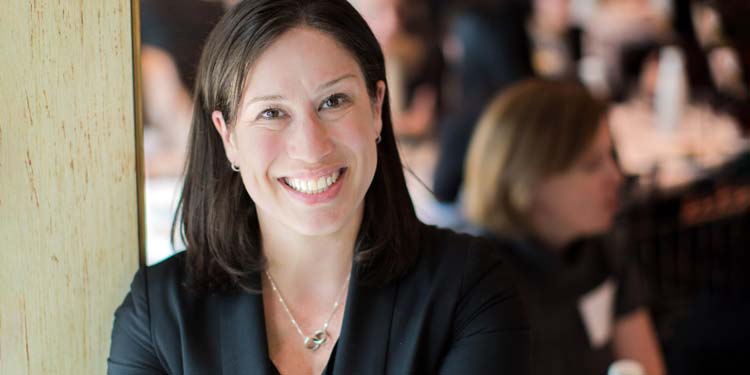In the fall of 2008, just a few weeks after Soumak Chatterjee (MBA '10) and Rachel Megitt (MBA '10) started the Full-Time MBA program at Rotman, the world fell into a financial crisis.
As they watched established firms go under, they grew increasingly concerned about the future and their job prospects after graduation. Still, rather than fixate on the uncertainty surrounding them, the students started looking at the financial crisis in a new way — as an opportunity to grow, learn and make an impact.
“It really helped shaped who I wanted to be in the face of a crisis,” says Megitt. “I wanted this to be a defining moment in a positive way.”

Rachel Megitt (MBA '10)
It was. The class of 2010 left Rotman well-equipped to lead teams through crises and complex challenges. Today, Megitt is the senior director of product management for term investments, savings, and personal and commercial banking at RBC. In her current work, she’s focused on driving product innovation and leveraging technology in developing new products. Meanwhile, Chatterjee is a partner with Deloitte’s Financial Services team in Toronto and leads the firm's Canadian payments and blockchain practice. He also oversees graduate and MBA recruiting for the consulting business at the firm.
In many ways, their experience parallels that of today’s students, who are now challenged with staying focused on their studies during an uncertain time. Recently, Chatterjee and Megitt reflected on their time at Rotman and spoke about their current experiences managing growing teams during a global pandemic in a recorded discussion, Looking Beyond the Crisis: MBA Alumni Perspectives.
Here are four things they want incoming and current Rotman students to know.
“There’s a silver lining and great opportunity for those of us who go through the MBA experience in the midst of a crisis — resilience.”
Rachel Megitt, Senior Director, RBC
Get ready, students: this crisis will open you up to new ideas and opportunities.
“There’s a silver lining and great opportunity for those of us who go through the MBA experience in the midst of a crisis — resilience,” explains Megitt, who worked extensively in consulting before starting at Rotman.
The Rotman MBA experience broke her out of her fixed mindset of continuing her career in management consulting. With the world around her rapidly changing, Megitt decided to step out of her comfort zone and pursue an exciting internship in London, UK with RBC Capital Markets.
“Not only was I living in one of the biggest global financial centres of the world, but I was now smack-dab in this incredibly dynamic and fast-paced industry,” she says. “I recognized that finance was an industry that I was truly passionate about and where I could see my future.”
Meanwhile, Chatterjee advises grads not to dwell too much on the uncertainty right now. When the financial crisis hit, he had only been in Canada for a few weeks. The crisis taught him to be strategic in connecting with like-minded professionals and approaching his job search.
“It actually makes you a more resilient leader to have lived through something like this,” he says. “Ultimately, this experience will teach you how to change your strategy and adapt to the situation.”
There will be jobs when you graduate.
 These days, Chatterjee is on the other side of the hiring process, and he’s confident there will be good opportunities waiting for students when they graduate.
These days, Chatterjee is on the other side of the hiring process, and he’s confident there will be good opportunities waiting for students when they graduate.
In his experience, big firms are always on the lookout for top talent.
“We will always have a very strong drive towards engaging with the best students, even in economically difficult situations, because that is what keeps the business going,” explains Chatterjee.
He suggests that students pay attention to business areas that seem to be thriving or rebounding faster during this crisis. For instance, with the rise of remote work, companies now understand the value of investing in digital and cloud-based technologies — this could be a great place for a new grad to step in and make a difference.
Inevitably, this crisis will spur innovation and new opportunities.
“There will be businesses that are created in the middle of the crisis. And those businesses will create jobs,” he says. “Trust the process. Trust your own abilities. This is a test of resilience for all of us.”
“Ultimately, this experience will teach you how to change your strategy and adapt to the situation.”
Soumak Chatterjee, Partner, Deloitte Canada
Take advantage of the resources available to you and leverage the Rotman network.
For students who are unsure of how to begin career planning, Chatterjee and Megitt say to start by taking advantage of the resources and knowledge at Rotman.
The Career Services team is skilled at helping students navigate career pivots and job searches. As well, many professors have industry connections and will not hesitate to connect students to their contacts. Other students at Rotman, including those from the Morning/Evening and Executive MBA programs, could be employed at interesting organizations and would be happy to help out a fellow student.
Ultimately, regardless of who you are reaching out to right now, Megitt recommends personalizing your approach by asking intelligent questions. She suggests asking practitioners about how they are adjusting to the disruptions to their daily work in an introductory email.
“It demonstrates your aptitude, your emotional sensitivity to the situation, your genuine interest, and then it creates a little bit of banter back and forth,” says Megitt. “If you're
considerate in how you're reaching out to companies and you're asking thoughtful questions in those initial reach-outs, it tends to feel a bit more personal.”
Embrace the opportunity.
Bottom line: take a deep breath, students.
While this is a very unusual time, this crisis presents a unique learning opportunity. Make the most of it. After all, Megitt points out that the challenges students face during this time will come up in future job interviews and discussions.
“This experience will become part of your story — so wouldn't you want to make it a good one?”
Written by Rebecca Cheung | More Student Stories »